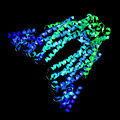Protein moonlighting
Protein moonlighting refers to the phenomenon where a single protein performs multiple, often unrelated, functions. This concept challenges the traditional one-gene, one-protein, one-function paradigm that has dominated molecular biology for decades. Moonlighting proteins can have different functions depending on factors such as cellular location, concentration, and the presence of other interacting molecules. This multifunctionality is not due to gene fusions, multiple RNA splice variants, or pleiotropic effects but rather is an intrinsic property of the protein structure itself.
Overview[edit]
The term "moonlighting" was first coined in the context of proteins by Jeffrey E. K. Hubbard and Paul M. Ridout in 1994, to describe enzymes that could perform additional, non-catalytic functions. Since then, numerous proteins have been identified as moonlighting proteins across various species, including humans, bacteria, and plants. These proteins play critical roles in cellular processes, including metabolism, signal transduction, and gene regulation, and their multifunctionality can have significant implications for understanding disease mechanisms and developing therapeutic strategies.
Examples[edit]
One well-known example of a moonlighting protein is glyceraldehyde-3-phosphate dehydrogenase (GAPDH), which is primarily involved in glycolysis. Besides its enzymatic role, GAPDH is involved in processes such as DNA repair, membrane fusion, and apoptosis. Another example is aconitase, an enzyme in the citric acid cycle that also functions as an iron-responsive element-binding protein, regulating iron metabolism.
Mechanisms[edit]
The mechanisms by which proteins moonlight are diverse and can include changes in cellular localization, alterations in protein conformation, and interactions with different binding partners. For instance, a protein might have one function in the cytoplasm and another when it is translocated to the nucleus or membrane. Alternatively, post-translational modifications such as phosphorylation can alter a protein's structure and, consequently, its function.
Implications for Disease and Therapy[edit]
Moonlighting proteins have significant implications for understanding disease mechanisms. For example, the multifunctionality of proteins can contribute to the complexity of diseases like cancer and neurodegenerative disorders, where proteins may play roles in both the initiation and progression of disease. Recognizing the moonlighting functions of proteins can also open up new avenues for therapeutic intervention, allowing for the targeting of specific protein functions.
Research Challenges[edit]
Studying moonlighting proteins presents unique challenges, as traditional biochemical and genetic approaches may not adequately reveal the full range of functions performed by a single protein. Advanced techniques, including proteomics and systems biology approaches, are therefore essential for identifying and characterizing the multifunctional roles of moonlighting proteins.
Conclusion[edit]
Protein moonlighting adds an additional layer of complexity to cellular biology, challenging traditional views of protein function and highlighting the intricate interplay of molecular processes within the cell. Understanding the multifunctionality of proteins has important implications for biology, medicine, and the development of therapeutic strategies.

This article is a biochemistry stub. You can help WikiMD by expanding it!
-
Protein moonlighting
-
Protein moonlighting
-
Protein moonlighting
Ad. Transform your life with W8MD's Budget GLP-1 injections from $75


W8MD offers a medical weight loss program to lose weight in Philadelphia. Our physician-supervised medical weight loss provides:
- Weight loss injections in NYC (generic and brand names):
- Zepbound / Mounjaro, Wegovy / Ozempic, Saxenda
- Most insurances accepted or discounted self-pay rates. We will obtain insurance prior authorizations if needed.
- Generic GLP1 weight loss injections from $75 for the starting dose.
- Also offer prescription weight loss medications including Phentermine, Qsymia, Diethylpropion, Contrave etc.
NYC weight loss doctor appointmentsNYC weight loss doctor appointments
Start your NYC weight loss journey today at our NYC medical weight loss and Philadelphia medical weight loss clinics.
- Call 718-946-5500 to lose weight in NYC or for medical weight loss in Philadelphia 215-676-2334.
- Tags:NYC medical weight loss, Philadelphia lose weight Zepbound NYC, Budget GLP1 weight loss injections, Wegovy Philadelphia, Wegovy NYC, Philadelphia medical weight loss, Brookly weight loss and Wegovy NYC
|
WikiMD's Wellness Encyclopedia |
| Let Food Be Thy Medicine Medicine Thy Food - Hippocrates |
Medical Disclaimer: WikiMD is not a substitute for professional medical advice. The information on WikiMD is provided as an information resource only, may be incorrect, outdated or misleading, and is not to be used or relied on for any diagnostic or treatment purposes. Please consult your health care provider before making any healthcare decisions or for guidance about a specific medical condition. WikiMD expressly disclaims responsibility, and shall have no liability, for any damages, loss, injury, or liability whatsoever suffered as a result of your reliance on the information contained in this site. By visiting this site you agree to the foregoing terms and conditions, which may from time to time be changed or supplemented by WikiMD. If you do not agree to the foregoing terms and conditions, you should not enter or use this site. See full disclaimer.
Credits:Most images are courtesy of Wikimedia commons, and templates, categories Wikipedia, licensed under CC BY SA or similar.
Translate this page: - East Asian
中文,
日本,
한국어,
South Asian
हिन्दी,
தமிழ்,
తెలుగు,
Urdu,
ಕನ್ನಡ,
Southeast Asian
Indonesian,
Vietnamese,
Thai,
မြန်မာဘာသာ,
বাংলা
European
español,
Deutsch,
français,
Greek,
português do Brasil,
polski,
română,
русский,
Nederlands,
norsk,
svenska,
suomi,
Italian
Middle Eastern & African
عربى,
Turkish,
Persian,
Hebrew,
Afrikaans,
isiZulu,
Kiswahili,
Other
Bulgarian,
Hungarian,
Czech,
Swedish,
മലയാളം,
मराठी,
ਪੰਜਾਬੀ,
ગુજરાતી,
Portuguese,
Ukrainian


